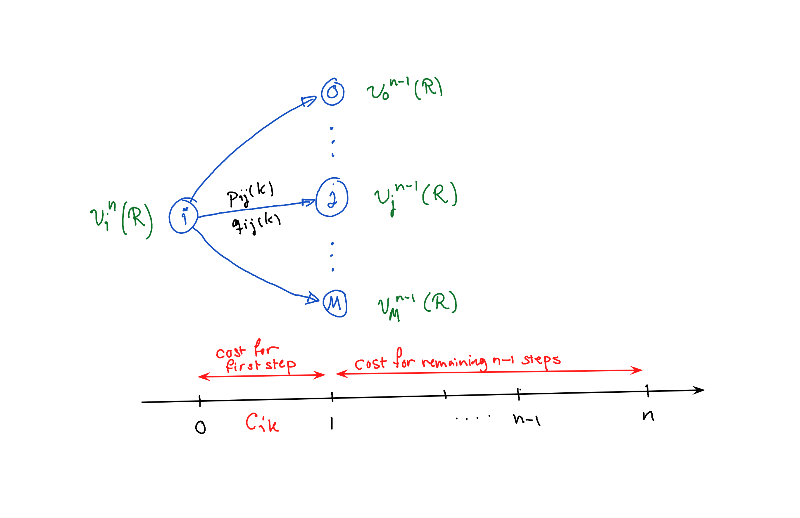- Basic theory for Markov chains and Markov processes
- Queueing models based on Markov processes, including models for queueing networks
- Models for inventory optimization, deterministic as well as stochastic.
- Models for optimization of spare parts
- Marginal allocation
- Dynamic programing, for recursive decision making
- Optimal control of Markov chains, for stochastic decision making.
SF2863 Systems Engineering 7.5 credits

The course has a focus on classical operations analysis and mathematical methods to analyze and optimize the operation of various systems. Subsystems are analyzed and we look at how the whole is affected by what happens in these parts. For example. we study how a queue depends on arrival intensities, service intensity and the number of agents active, and then relate this to how the overall system, consisting of several such coupled queues, behaves. This is an example of a stochastic system that we model using Markov processes.
Also included are methods such as dynamic programming and controlled Markov chains that can be used to find the best strategies for controlling processes in the short and long term. Another tool for integer optimization is marginal allocation. We use it for problems where you have diminishing returns.
Other systems we study are inventory systems and maintenance systems.
- Based on assumptions about product demand, it is important to determine inventory levels to ensure availability, but at a reasonable cost.
- For maintenance, the availability of spare parts is similarly important, and we produce decision-making material for the decision-makers who make the trade-off between cost and availability.
Information per course offering
Information for Autumn 2026 Start 26 Oct 2026 programme students
- Course location
KTH Campus
- Duration
- 26 Oct 2026 - 11 Jan 2027
- Periods
Autumn 2026: P2 (7.5 hp)
- Pace of study
50%
- Application code
12462
- Form of study
Normal Daytime
- Language of instruction
English
- Course memo
- Course memo is not published
- Number of places
Places are not limited
- Target group
- No information inserted
- Planned modular schedule
- [object Object]
- Schedule
- Schedule is not published
- Part of programme
Master's Programme, Applied and Computational Mathematics, year 3, OPST
Degree Programme in Industrial Engineering and Management, year 3, TMAI, Mandatory
Master's Programme, Applied and Computational Mathematics, year 2, OPST
Master's Programme, Applied and Computational Mathematics, year 2, CSSE
Master's Programme, Applied and Computational Mathematics, year 1, OPST
Master's Programme, Applied and Computational Mathematics, year 1
Master's Programme, Applied and Computational Mathematics, year 2
Degree Programme in Engineering Mathematics, year 3
Master's Programme, Mathematics, year 1
Master's Programme, Aerospace Engineering, year 1, Mandatory
Contact
Course syllabus as PDF
Please note: all information from the Course syllabus is available on this page in an accessible format.
Course syllabus SF2863 (Autumn 2020–)Content and learning outcomes
Course contents
Intended learning outcomes
To pass the course, the student shallbe able to do the following:
- Apply basic theory, concepts and methods within the parts of systems engineering that is described in the course contents to solve problems.
- Formulate simplified problems within the application areas described by the course contents using mathematical models and optimize these with the help of software.
- Read and understand mathematical writings on, for example, linear algebra, analysis and systems engineering, and their applications, communicate mathematical reasoning and computations within this area orally and in writing in such a way that it is easy to follow.
To receive the higher grades, the student shallin addition be able to do the following:
- Explain, combine and analyze basic theory, concepts and methods within the parts of systems engineering that is described in the course contents.
Literature and preparations
Specific prerequisites
Completed advanced courses in Probability theory (SF2940 or equivalent).
Literature
Examination and completion
Grading scale
Examination
- TENA - Written exam, 6.0 credits, grading scale: A, B, C, D, E, FX, F
- HEM1 - Home assignment, 1.5 credits, grading scale: P, F
Based on recommendation from KTH’s coordinator for disabilities, the examiner will decide how to adapt an examination for students with documented disability.
The examiner may apply another examination format when re-examining individual students.
If the course is discontinued, students may request to be examined during the following two academic years.
Examiner
Ethical approach
- All members of a group are responsible for the group's work.
- In any assessment, every student shall honestly disclose any help received and sources used.
- In an oral assessment, every student shall be able to present and answer questions about the entire assignment and solution.